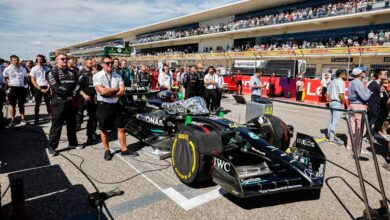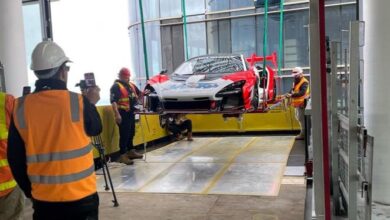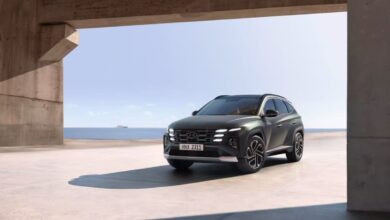GM Suspends All Cruise Autonomous Testing After Crash

Good morning! It’s Friday, October 27, 2023, and this is The Morning Shift, your daily roundup of the top automotive headlines from around the world, in one place. Here are the important stories you need to know.
1st Gear: GM Cancels Operations in California, Texas and Arizona
General Motors is having a rough time right now, what with its workforce striking and California rescinding its license to operate robotaxis in the state. Now, that move from California has had a knock-on effect on the rest of GM-backed Cruise’s autonomous operation.
The self-driving car company has grounded its entire U.S. fleet of robotaxis just days after California banned its robotaxis from the streets of San Francisco over safety fears, Bloomberg reports. The company suspended its entire U.S. fleet, which includes self-driving cars in Arizona and Texas, according to Bloomberg:
“The most important thing for us right now is to take steps to rebuild public trust,” Cruise said in a post on X, the social media site formerly known as Twitter. “In that spirit, we have decided to proactively pause driverless operations across all of our fleets.”
In total, Cruise had 400 self-driving vehicles operating autonomously in San Francisco before the ban. Across the U.S., the company had a further 200 autonomous vehicles in Austin, Houston and Phoenix.
While the company has ceased its fully self-driving services for now, it will continue to run cars with safety drivers in place. In addition, Bloomberg reports that the company remains committed to expanding its service across America. As such, it will continue its “developmental work in 11 other cities.”
2nd Gear: Lamborghini Wants An Easy Way To Go Green
Tightening emissions rules around the world mean that supercar companies are having to follow other automakers down the path of electrification. Aston Martin partner with Lucid for its motor tech, for instance, and Rimac has been out here breaking all kinds of EV speed records. Now, Lamborghini has weighed in and warned that it might not actually go down the battery-powered route.
The Italian supercar maker, which is part of the VW Group, instead is hoping for clarity on sustainable e-fuels and their future uses, according to a report from British outlet Autocar. Despite already having a hybrid-electric model in the works, Lamborghini now says it will only commit to fully electric models once a decision has been made about the role synthetic fuels will play in the future. Autocar reports:
Lamborghini Chairman and CEO Stephan Winkelmann told Autocar that his company “can afford to leave the door open for a few years yet.”
“Synthetic-fuelled sports cars would be an easier leap for us, but we have to wait and see what the legislators decide about them, and whether we can get global agreement on their viability,” Winkelmann said.
According to Winkelmann, this doesn’t mean Lamborghinin is giving up on EVs entirely. The company still plans to release a new Urus SUV and the new Lanzador GT, which will both be fully electric by the end of the decade.
However, the company is instead hesitant about electrifying its flagship models. This means that the company’s hypercars and super sports cars will be hybrid for “eight or nine years from now,” Winkelmann told Autocar. After that point, the company will reevaluate its position on EVs.
3rd Gear: EV Demand Will Be The Next Hurdle For America’s Automakers
Ford might have just agreed to a new contract with the United Auto Workers union, but the Blue Oval and its fellow American automakers are staring down the barrel of another problem that’s set to hit the industry: dwindling interest in EVs.
While EV sales soared initially as more and more automakers moved into the segment, that enthusiasm is stagnating according to a new report from the Detroit Free Press. As a result, companies like Ford and General motors are backtracking on their EV targets, and Honda has even canceled a tie up with GM that would see the pair produce “affordable” EVs. The Free Press reports:
GM exemplifies the dilemma many carmakers face. The early adopters who bought EVs have gone home and the remaining consumers are hitting pause on EV consideration amid economic uncertainty, the lack of a widespread and reliable charging network and continued higher prices for most EVs compared with gasoline-powered counterparts, industry experts said.
According to Edmunds.com data, the average EV transaction price in September was $59,674, not including a $7,500 tax credit for those that are eligible. That compares with the industry average transaction price of $47,698.
The saving grace for America’s electric future could be tightening emission rules across the country. New regulations from the Biden administration put tight limits on the average emissions across an automakers, and EVs do a good job at slashing those averages. However, if automakers like Ford and GM aren’t building and selling battery-powered cars, their averages will rise and they could face massive fines if they fail to hit the new targets.
4th Gear: UAW Strike Cost For $1.3 Billion
Ford had reason to celebrate this week after the United Auto Workers union finally reached a tentative agreement with the automaker that could bring its 41-day strike to an end. However, the financial impact of the strike could stick with the Blue Oval for a while yet.
The Blue Oval claims that it lost $1.3 billion over the course of the 41-day strike, which Automotive News reports effectively wiped out its $1.2 billion earnings for the last quarter. The majority of these costs will be felt through the company’s fourth quarter, which won’t be reported until the end of 2024. as Automotive News explains:
About $100 million of the strike’s cost was in the third quarter, allowing Ford to post a third-quarter net profit after an $827 million loss a year earlier. But the strike cost Ford $1.2 billion in the beginning of the fourth quarter, and the automaker withdrew its full-year guidance as it waits for Ford’s 57,000 UAW members to vote on the agreement.
What’s more, the company says the new deal will increase manufacturing costs across its lineup. Ford CFO John Lawler warned that the deal will increase Ford’s labor costs by between $850 and $900 for every vehicle it sells. This equates to a cut in profit margins by just “six- or seven-tenths of a percentage point,” Automotive News reports.




